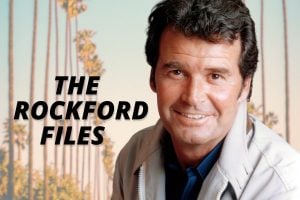The immensely popular 1960s show came in hot on the heels of the Cold War era fascination with the spy trade, blending absurdist comedy with goofy gadgets, nefarious characters bent on world domination, and dapper secret agents.
Starring Don Adams as the bumbling Maxwell Smart (aka Agent 86) and Barbara Feldon as his female cohort (Agent 99), the Emmy-winning sitcom ran for a total of 5 seasons on NBC and CBS, going on to inspire a revival series and a feature film more than 30 years after its initial broadcast run.

Get Smart: Spies go to the dogs in cloak-and-giggle drama
The Orlando Sentinel (Florida) August 1, 1965
Charlie Chan and Ellery Queen were amateurs compared to the private eye who will color up NBC television beginning in September. “Get Smart” is scheduled for 8:30 to 9 pm, Saturdays.
Did Charlie Chan have mirrored cufflinks to see who was following him? Maxwell Smart does. Did Ellery Queen have a telephone in the heel of his shoe? Maxwell Smart does.
He is described by series co-creator Mel Brooks and story editor Buck Henry thusly: Smart is in his mid-30s. He has been carefully trained over a number of years by Control, a top-secret government organization, which has given him an expert professional knowledge of counterespionage.
He speaks many languages; has a working familiarity with every deadly weapon; is adept at karate, judo and jiujitsu. But his most prominent characteristic is an unfailing, unflagging, almost abnormal determination to do his job and do it well; to wipe out crime and eradicate evil.

Hilarious spoof
This determination is a two-edged weapon. On the one hand, it provides him with a boyish and, in fact, lovable sincerity. On the other, it tends to involve him in errors of timing and judgment which, to a less lucky secret agent, would indicate an early retirement.”
Don’t, thoughtful reader, take any of this seriously. The entire series is one of the most hilarious spoofs on private eyes ever to be presented on television or in any other medium.
Star Don Adams has innumerable claims to fame, among them, a dedicated supper club following of fans, a by-now-cliche he cooked up on last year’s Bill Dana series: “You really know how to hurt a guy,” and a real working knowledge of the wild weapons he’ll operate in “Get Smart.” (He was a drill instructor in the Marine Corps during World War II.)
What else has “Get Smart” to offer? The tiger girl, that’s what. The tiger girl of countless commercials, Barbara Feldon, chalks up her first television series, after building a reputation and bank account as one of the top models in New York City.
![]()
Just Agent 99
Barbara doesn’t have a name on “Get Smart.” She’s “Agent 99,” and even though Maxwell Smart may invite her out for a Chinese dinner now and then, she’s still “99” to him.
And then we have “Fang.” Fang is a large, shaggy dog without which a secret operator couldn’t operate efficiently. So well trained is Fang that when Agent 99 sneezes, Fang barks to say “Bless you.” So well trained is Agent 99, she says “Thank you.”
For girl-watchers, Agent 99 won’t let you down. She, like Don Adams, will wear a variety of disguises, but whereas his may encompass mustaches, strangely-fitting trenchcoats or specially-designed suits with espionage-type gimmicks, Agent 99 has gone into training for her role.
“Up until I signed for this series,” she told a newsman recently, “my most strenuous activity had been walking up the five flights of stairs to our apartment in New York. Now I’m learning to ride horseback, taking fencing and driving lessons.”

As for Maxwell Smart’s private life, he’s not an affluent spy, of course, but he does live in a comfortable apartment — alone.
And wouldn’t you just know the Talent Associates group of executives, including producer Jay Sandrich, would select a special effects man on their crew primarily for his name — Percy Hyde.
“Who’s better suited for a spy series?” says Sandrich, again with all seriousness. It’s he who takes particular delight in pointing out that entry to the production company’s offices can be reached only by a long, dark and eerily echoing tunnel.
“That’s how we get in the mood to create our stories. We always figure someone’s following us,” says Sandrich, clicking his heels in the ghostly tunnel.
Get Smart opening theme & credits

Get Smart: Ex-Marine Don Adams bumbles to success as KAOS-fighter (1967)
From the Waco Tribune-Herald (Texas) November 26, 1967
HOLLYWOOD — While new shows continue to flounder on the home screens this season, a fast-talking World War II Marine veteran and former commercial artist continues to enjoy popularity in his third season as the star of NBC-TV’s “Get Smart.”
He’s Don Adams, who skillfully portrays the funny, bumbling Maxwell Smart, Secret Agent 86, ably assisted by co-star Barbara Feldon as Agent 99.

As top agent for CONTROL, a government organization fighting the sinister forces of KAOS, Maxwell Smart is quick with his fists but sluggish with his wits as he conceals his natural incompetence behind a mask of arrogance. His mannerisms include a curiously clipped nasal voice and eyes that are slitted with suspicion and which often cross in agonies of concentration.
Miss Feldon manages to distract KAOS while extricating Maxwell Smart from his antics as the world’s champion bumbler. She is a former “Copacabana Girl,” winner of “The $64,000 Question,” former top New York model, and “Tiger Girl” in TV commercials (see separate story), Ed Platt plays the long-suffering Chief of CONTROL who is continually on the receiving end of Max’s “Sorry about that, Chief.”
Adams’ wife is the former Dorothy Bracken, who once was a June Taylor Dancer. They have been married seven years, and have one daughter, Stacey Noel, 2. Adams lived most of his life in New York before “Get Smart,” and had quite an adjustment to make to the more relaxed casual way of living in California when he and his wife came West for the series.

Recalling the big move, Adams says, “We came by train because I hate to fly. I’ve flown all over the world, but four bad flights in succession cooled me on flying.” Adams’ dislike of flying doesn’t apply to altitude, however. He lives in a Hollywood hilltop home of modern design with a breathtaking view of the Los Angeles basin.
The house itself combines glass, stucco, and wood in keeping with California modern architecture. It has three bedrooms, a nursery, and a den. Dorothy’s decorative tastes run to contemporary furniture with color schemes of white, blue, and green.
While their property is not large, it does include a swimming pool. “I never have much time to swim, but Dorothy lives in the pool,” Don says. “Whenever I have a few hours off I play golf.”
Don is a member of the Riviera Country Club, which boasts an all-star membership. He plays 18 holes in the mid-80s and complains that his game isn’t what it used to be. There is a nurse at home to look after little Stacey, but no other servants.
Dorothy does the cooking, and, according to her husband, is endowed with a special genius for making peanut butter and jelly sandwiches. “She’s also pretty good at steak and potatoes,” Adams adds. “But she spends most of her time shopping at expensive shops — that is when she’s not playing tennis or taking golf lessons.”
Don’s day begins at 7 a.m. at Paramount’s Sunset studios — a five-minute drive down the hills — three days a week. On Mondays and Tuesdays, he doesn’t have to report until 9. However, most evenings he’s busy on the sound stages until 8 or 9 pm.

“One thing I like about California is the way people dress out here,” Don sighs. “I’m strictly a sweater and slacks man. Back in New York, I couldn’t go out of the apartment without a suit and necktie. I hated it. But I really miss New York. I didn’t know two ways of life could be so different in the same country.”
In addition to adding “Would you believe,” and “Sorry about that, Chief,” to the language, Adams has joined with comedian friend Bill Dana, and Bill Silverstein to form an advertising agency, ADS, Inc. Adams, the comedian, the husband, and father, likes to read history books, especially about the Civil War. In person, he is a serious, reflective, and articulate individual.
Donald James Yarmy, alias Don Adams, was born April 13, 1927, in New York City where his father, William Yarmy, was in the restaurant business. Adams was the middle child in a family of three children, including an older sister and younger brother. He received his early training for his career from the hours he spent at the movies.

Restless with schooling and anxious to get into World War II, he enlisted in the Marines at 16, lying about his age. He served four years, seeing action in Guadalcanal. After the War, he attended Terry Art Institute and became a commercial artist. But he began writing comedy material on the side and working in small clubs as a comedian.
“I’d always been able to do impressions and catch voices. One day I tried to audition for ‘Arthur Godfrey’s Talent Scouts’ — without an appointment. They asked my name and I said, ‘Don Adams.’ A week later, I was on the show and from then on I worked as ‘Don Adams.'”
Garry Moore, with a morning show, signed Don Adams for nine appearances. This led to 20 guest spots on Steve Allen’s “Tonight Show” and an NBC special, “Salute to Baseball,” on which he did his famed umpire school routine. His career was rolling.
He became a regular on the “Perry Como Show!” for a year-and-a-half. He took a three-week hiatus from the “Como Show” to star in the Broadway play “Harold.” “We closed in three weeks. The reviews weren’t bad, it was the word-of-mouth that killed it,” he said.

He followed this with nine “Jimmy Dean Shows,” and joined Garry Moore’s nighttime show for numerous outings and performed on almost every TV variety program, including NBC-TV’s “Tonight Show Starring Johnny Carson.” His final step before “Get Smart” was the role of house detective Glick in “The Bill Dana Show.”
Adams may fumble every assignment as Maxwell Smart, but, according to experts, he has the best taste in clothes for any TV performer. CALMAC, the Men’s and Boys’ Apparel Club of California, has named him best-dressed man in television. His entire wardrobe for the top-rated series is designed by Ron Postal, Beverly Hills clothier-designer. It marks the first time in television that a designer has been assigned exclusively to a male star.
Smart is a smart dresser. He has 12 suits and sport coats, each costing more than $200. The colors are chameleon-conservative grays and blues. Smart doesn’t like browns. Like any good spy with a high price on his head, Smart wears a bulky English trench coat — but no hats. He’d only lose them.
“There are different kinds of looks in clothes,” explained the show’s wardrobe supervisor, Donald McDonald. “There’s the Ivy League Look, the Gray Flannel Suit Look, and others. They’d be too conspicuous for a spy. Smart’s been given the International Look. It’s … suitable anywhere.”
“Unlike some styles these days, his coats and trousers have lots of pockets. Spies need lots of pockets.”

Barbara Feldon co-spies in Get Smart (1967)
From the Waco Tribune-Herald (Texas) November 26, 1967
Barbara Feldon is a girl who grew up wanting to be Pinocchio or Tarzan, but turned into a beautiful and brainy Secret Agent 99 on NBC-TV’s “Get Smart.”
Miss Feldon was born Barbara Hall in Pittsburgh, Pa., the youngest daughter of Ray and Julia Hall. As a teenager, she studied dancing, seriously planning on making it her career. “I finally gave it up. Five-foot 9-inch lady dancers have never been the vogue,” she said.
At 17 she enrolled at the Carnegie Institute of Technology, became interested in drama, and forgot about dancing. After being graduated, she went to the New York area and for two years worked in community theatre, including the John Drew Theater, Long Island, and Bucks County Playhouse. She next appeared in the “Copa line” of the Copacabana nightclub, famous for pretty girls in the chorus line.

Barbara then received a “crawl-on” part in “Caligula.” “I crawled onstage; I ate a few grapes,” she said. “The best I ever did in acting in legitimate theatres were small parts in off-Broadway flops.” This led to a part in the Beatrice Lillie Revival of ”Ziegfeld Follies.” During the run, she and the chorus line were tested for The $64,000 quiz game, on which she won $64,000 for her knowledge of Shakespeare.
Winning a Shakespeare quiz was great publicity for Barbara, but aside from the money (she invested in clothes and stocks), it didn’t do much for her career except earn the hatred of the other girls in the Ziegfeld Follies.
After a brief attempt as an art dealer, she tried modeling again, and it worked — she appeared in top national magazines. This led to her work in TV commercials where she became famous as the “Tiger Girl” and popularized the words, “Sic ’em Tiger.”

ALSO SEE: Before they were famous: 35 celebrities who were models before becoming stars
In 1964 she won the role of George C. Scott’s girlfriend in “East Side, West Side.” After that followed 16 other shows, including “Flipper,” “The Reporter,” “The Man from U.N.C.L.E.,” “12 O’Clock High,” “The Nurses,” and “Slattery’s People.”
The role that got her the part of Agent 99 was an industrial spy she played on the former “Mr. Broadway” series produced by David Susskind’s Talent Associates, Ltd., the same company doing “Get Smart.” Barbara recently completed her first motion picture, “A Garden of Cucumbers” with Dick Van Dyke, and recorded two songs, “Max,” and “It.”
One of her hobbies is doing needlepoint work. She has been married for nine years to Belgian-born Lucien Verdfox Feldon, a photographers’ agent. They divide their time between New York and Hollywood apartments.
Miss Feldon still chooses her friends for what they are rather than who they are. In other words, the Hollywood caste system has not reached her yet. “I doubt whether it ever reaches TV people,” says Barbara. “Only motion picture people seem to get boxed in, unable to make friends out of their rare social stratosphere.”
She is the kind of down-to-earth girl who finds the star system ridiculous: “I feel very sorry for so-called stars who are idolized for being something they are not. ‘Idols,’ says Barbara emphatically, ‘are not idols but people, and people are human, with human faults, frailties, and strengths.'”
Since beginning “Get Smart,” Barbara’s life has altered greatly. So have her attitudes.
“I used to think everything began and ended in New York,” she says. “My life was one in which I was wrapped up in man-made beauties — the theatre, clothes, art. I was living the exciting chic life I envisioned for myself as a child. I never thought there was a world outside of New York. In fact, I always poo-pooed the ‘See-America-First’ campaign. When out of New York, I was out of the country.

“Then came ‘Get Smart.’ With my husband, I travelled by car to the coast,” says Barbara. “I couldn’t believe what I saw. My eyes were constantly dazzled by the incredible God-made cultural center of the world, the representation of all that man can create.
“Then the West is the representation of all the visual and spiritual beauty that only God can create. That trip changed my viewpoint completely on living. I could no longer reside only in New York. Happily, my work allows me to be on both coasts. I don’t know what I’d do if I had to make a choice.”
Barbara is one of the few who didn’t come to Hollywood with the dream of fame. “To me, acting was only a business. It still is. I love my work but can’t honestly say I have ever sought it in order to become a super-star.
The fame that has come to Barbara has been very pleasurable and with no pain whatsoever. “I may be the only actress in the world who has no regrets about anything that has ever been printed about me. I have never even been misquoted. Isn’t that amazing?”
Barbara Feldon for Rockwell International in 1976




















